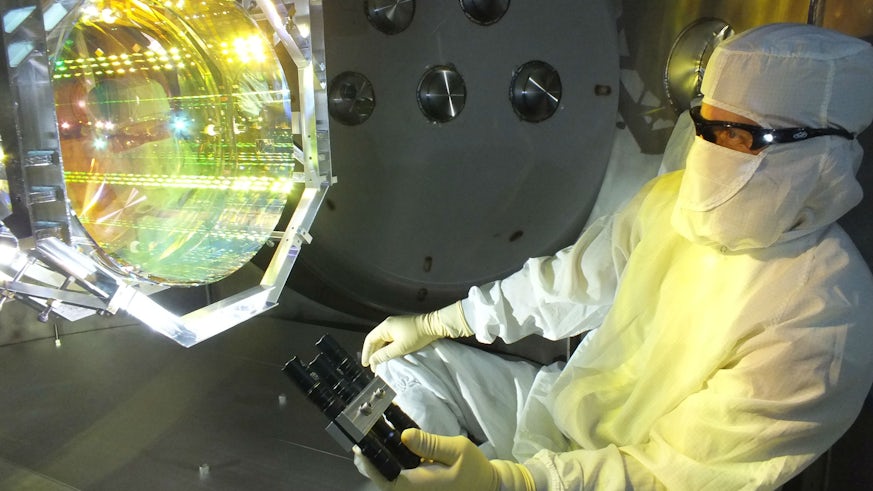Better ‘hearing aids’ to listen to the Universe
23 January 2019

The world’s most sensitive science experiment may be about to get even better, with the UK allocating funds for new research and development work as part of the hunt for gravitational waves.
After their historic first round of detections from 2015 onward, Cardiff University researchers, who form part of the Laser Interferometer Gravitational wave Observatory (LIGO), are planning to start their third period of recording data from twin detectors in the United States.
The UK Research and Innovation funding will support research into making the detectors even more sensitive, and therefore even more likely to detect black holes and other cosmic events.
Up to £11 million has been earmarked for the work, subject to further discussion with other funders and the research community.
Professor Mark Thomson, Executive Chair of STFC, said: “LIGO’s historic first detections of gravitational waves were only made possible by combining UK technology, sustained international funding, and enormous dedication and hard work by more than a thousand scientists from around the world.”
Gravitational waves are ripples in space caused by massive cosmic events such as the collision of black holes or the explosion of supernovae. They are not electromagnetic radiation, and as a result were undetectable until the technological breakthroughs at LIGO.
At each LIGO site, twin laser beams are transmitted down two 4-kilometre long tubes kept under a near-perfect vacuum, and arranged as an L-shape. The beams are reflected back down the tubes by mirrors precisely positioned at the ends of each arm.
As a gravitational wave passes through the observatory, it causes extremely tiny distortions in the distance travelled by each laser beam.
Research undertaken by Cardiff University’s Gravity Exploration Institute has laid the foundations for how we go about detecting gravitational waves with the development of novel algorithms and software that have now become standard tools for detecting the elusive signals.
The Institute also includes world-leading experts in the collision of black holes, who have produced large-scale computer simulations of these violent cosmic events that were instrumental in decoding the gravitational-wave signals that LIGO has already observed.
The Cardiff Gravity Exploration Institute recently expanded to include a new team of researchers specialising in the design of gravitational-wave detectors. This team will contribute to the planned upgrade of LIGO, working specifically on a new gravitational wave signal readout system.
Professor Hartmut Grote, from the School of Physics and Astronomy, said: "The funds will allow us in Cardiff to contribute to improving the sensitivity of the Advanced LIGO detectors over the next few years to a level where we expect to detect four to seven times more gravitational wave signals compared with current instruments.
“This will be an exciting boost in our pursuit to a deeper insight into astrophysics with gravitational waves, with many more scientific surprises to come.”
Share this story
It is a friendly, approachable School with a strong commitment to teaching excellence and world class research in physics and astronomy.


